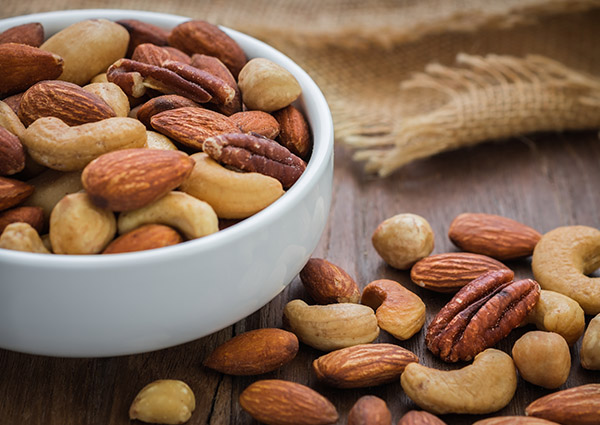
The Best Nuts to Eat for Better Health
Versatile nuts are nutritional multitaskers. They supply heart-healthy monounsaturated fats, protein and fiber, and eating nuts regularly can promote heart health, reduce diabetes risk and fight inflammation. Available in various shapes, sizes and flavors, nuts are an excellent option no matter what variety you choose. Here are our favorite nuts to snack on and incorporate into meals to boost essential nutrients and overall health.
Walnuts: One of the most widely available nuts, walnuts are used in dishes around the world. They’re great in everything from trail mix to fruit salads to muffins. This nutritious nut boasts the benefits of omega-3 fatty acids, making it one of the healthiest nuts. Its known health benefits include an increase in cognitive function, anti-inflammatory benefits and heart protection. For extra flavor, toast walnuts before adding to any recipe.
Almonds: A close relative of the plum and peach, almonds are rich in vitamin E and a good source of fiber, magnesium and protein. Monounsaturated fat, the “good” fat that helps reduce cholesterol, is also found in almonds. Roasting them before adding to casseroles or salads brings out their nutty flavor. For variety, try almond butter instead of peanut butter.
Cashews: Rich, sweet and buttery, cashews are a good source of copper, iron, magnesium and protein. They’re commonly found in many North African and Asian dishes. Cashews are also great for snacking, adding to salads or combining with chicken in stir-fries. For a vegan-friendly cashew cream sauce, soak cashews overnight, then blend with lemon juice and nutritional yeast.
Peanuts: The peanut is actually a legume, not a nut. Asia and Africa provide 90% of the world’s production, and about half of the U.S. peanut crop is used to make peanut butter. Peanuts are a good source of fiber, folic acid and protein, and perfect for adding to stir-fries, lettuce wraps or salads. Don’t forget to enjoy them in granola and peanut brittle.
Pecans: These buttery-rich, sweet nuts are a good source of copper and fiber. They’re popular in pies, cakes and other desserts. Their high oil content requires pecans to be used quickly. Refrigerate in an airtight container for up to three months or freeze up to six months.
Pine nuts: From the cones of a pine tree variety, these seeds can increase energy levels due to their protein, iron and magnesium. The classic foundation to Italian pestos, they’re also used to top pasta dishes, salads and sautéed vegetables. In some recipes, pine nuts are referred to as “pignoli,” their Italian name.





